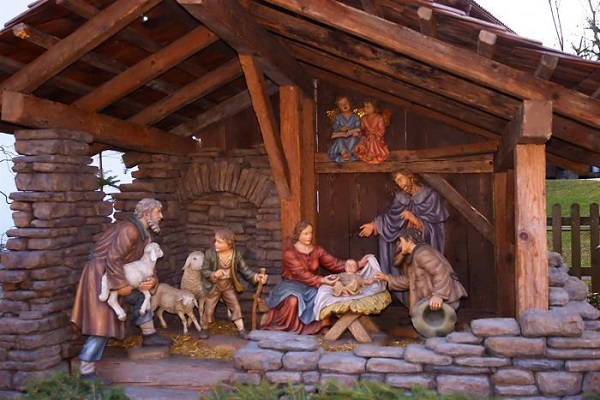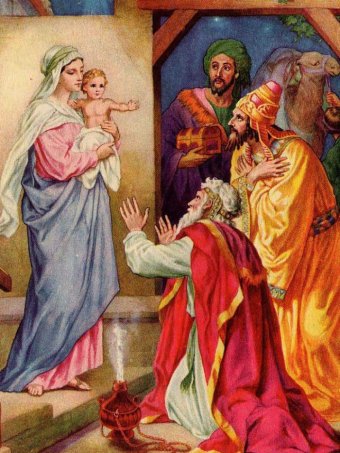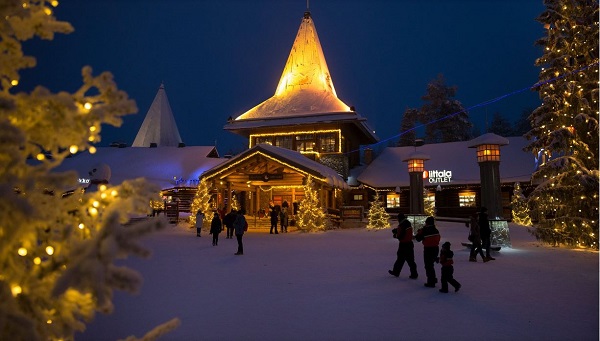
Climate Plus wishes you a pleasant Christmas/New Year and health and happiness for 2018.
My friends from Erlangen are presently staying with their son and his family in Norway. They report that Norway is now a very secular country, where hardly anyone goes to church. In 150 Christmas cards there were dogs, cats and snow galore, four churches as part of village scenes, and precisely no nativity scenes.
I work for an Indonesian woman, who asked me whether I celebrate Christmas. I said, kind of, the German and European tradition I come from pretty much invented Christmas.
She said, in Indonesia the Christians do, but the Muslims don’t.
Seems that here too Christmas is departing from Christ and Christianity, to a generalised notion that we should emphasize peace and happiness, and that it is a time when families come together, be nice to each other, sometimes with difficulty, give each other presents and be happy and peaceful.
Looking at Christmas cards here, I don’t see many with scenes of the nativity, more with Christmas trees and decorations, reindeer, and of course Santa Claus.
Apparently the song O Tannenbaum was a 16th century Silesian German folk song about the fir tree which exemplifies strength and fidelity. Perhaps by the 19th century, certainly by the 20th, the song was associated with Christmas.

Robyn J. Whitaker of Trinity College, University of Divinity, outlines What history really tells us about the birth of Jesus. See also Andrew McGowan’s How December 25 Became Christmas and the Reverend John Sanderson’s Are Christians and the churches ruining Christmas through a lack of humility?.
As I was writing last night Rod Quinn on ABC Nightlife was talking to a knowledgeable person about Christmas traditions around the world.
Seems a lot of the story as we know it has been made up, and took a long time to settle – centuries, in fact. The 25th of December gets the gig for a number of reasons. Firstly, 25 March is targeted as when Jesus died, so a birth on 25 December would mean he was conceived and died on the same day of the year.
Then there is the winter solstice, which the Europeans, where this tradition arose, have known about for at least 10,000 years.
Third, 25 December was the birthday of Mithra, and the religion Mithraism competed with Christianity among the Romans for a few centuries.
No-one knows for sure, but they are fairly sure that there was a census in 4BC. Beyond that it seems there was no inn, rather a room in the house, the main room where animal mangers could also be found. Mary gave birth, swaddled Jesus in cloth and laid him in a feeding trough.The animals themselves were added centuries later. When you think about it, if it was the middle of winter shepherds would not have been out in the paddock, the animals would have been inside, and a feeding trough is the last place you would put a baby.
Here is one depiction:

Doesn’t look very practical to me. Then there was the three wise men, who were probably not magi, or kings, or even three:

Whitaker says:
- The tradition of three comes from the mention of three gifts — gold, frankincense, and myrrh.
Notably, the magi visit Jesus in a house (not an inn or stable) and their visit is as late as two years after the birth. Matthew 2:16 records King Herod’s orders to kill baby boys up to the age of two based on the report about Jesus’s age from the magi.
This delay is why most Christian churches celebrate the visit of the magi on “Epiphany”, or January 6.
So the family did do a runner from Herod’s purge of all male babies under two years old, but there is no mention of Mary riding a donkey.
Much of the commercialisation of Christmas seems to arise during the 19th century, and no doubt Dickens’ A Christmas Carol had an influence. Earlier, Luther had an influence by preferring December 25 to Saint Nicholas day of 6 December, although Saint Nicholas is thought to be the progenitor of Santa Claus (Sinterklaas in the Netherlands).
I always thought Santa had a factory at the North Pole, but most people know now the ice is a bit thin there. Everyone who has been paying attention knows now that he is set up in Rovaniemi, Finland. You can go there and have a look:

Whitaker says:
-
The Jesus story, in its historical context, is one of human terror and divine mercy, of human abuse and divine love. It is a story that claims God became human in the form of one who is vulnerable, poor and displaced in order to unveil the injustice of tyrannical power.
And we should think about babies in distress, other than that one baby.
Sanderson is stronger:
- The Christmas story is, in essence, a story of how people from all walks of life, regardless of race, gender or any other bureaucratic classification, had an encounter with God, and how as a consequence their lives were transformed.
They encountered Immanuel, God with us, in the here and now. They came to understand that whoever they may be, whatever form their lives may take, whatever their personal circumstances, that “Immanuel”, is “God with us”. They came to understand that God is present in both our hope and our despair, in our good times and bad, in our highs and in our lows.
It was this realisation that enabled the ancient Christians in the Middle East to begin to transform their lives and the lives of their communities.
If we too have that same experience, that sense of the presence of God in our lives, and in the lives of those around us, then we will not only see our own lives transform, but also those of the people around us.
I’m too much the sceptic agnostic to go with him all the way, but I like his general approach. If we want a better world, we’ll have to make it ourselves.
One thing that struck me yesterday was listening to JS Bach’s Christmas Oratorio. The overwhelming feeling was Sehnsucht, yearning. I had to check his dates, which are 1685-1750. Life at that time was still largely a vale of tears preparing for a better life hereafter.
Then there is the story of the Annunciation, the Angel Gabriel telling Mary she was preggers, and why.
_-_Annunciation_-_Google_Art_Project_450.jpg)
In my youth I was told that it was that we were by nature sinful and it was about washing away our sins and entry into eternal life:
- For God so loved the world, that he gave his only begotten Son, that whosoever believeth in him should not perish, but have everlasting life.
I looked up what Weihnacht means. Literally it is consecration night.
With all that tradition floating about, we are keeping things simple at our place. Our daughter and her family came and went last month, I might do another post on our experience of the actual year, our two sons will be here for lunch and we’ll have the aircon on, as it promises to be a stinker.
Last year I spoke a lot about health. It’s been better this year, we’re OK and life is good.
So from Climate Plus we sincerely wish you a pleasant Christmas/New Year, health and happiness for 2018. Beyond that, may there be purpose and meaning in your life, but the capacity to be in and enjoy the moment.

Almost sixty years ago my first real job was as a temp in a department store for the Christmas rush. On my first day all the temps were addressed by some bigwig who attempted to impress upon us the importance of the season by saying, “Christmas is the most important time of the year for us in retail; it’s our Mecca”.
Has to be the mixed metaphor of the (20th) century.
Compliments of the season to you and yours Brian, and may the spirit of Christmas prevail in this forum over the next year.
Thankyou for your kind wishes and support through the year, zoot. May all good things happen in your life, and we’ll battle on here while we have a little strength.
Thankyou to all those who expressed good wishes on other threads. I find I have to focus to get things done, and there is always the next post to write.
It’s very quiet around here and I think I head a car door, that’s through Beethoven’s Emperor Concerto. Always feel sorry for the poor bugger – created all that sublime music he never heard.
Many thanks Brian,
For an outstanding year and and this fine post.
There is sublime music and art based on Christmas, which many of us can share, whatever our religious or agnostic beliefs.
Yearning is strong.
We used “Away in a Manger” as a lullaby for its gentleness and melody – which, come to think of it, expresses yearning.
I hesitate to lower the tone, but one of the strongest statements I’ve seen, on Jesus and us, is by Douglas Adams:
Jesus told people they should be kind to each other, so they nailed him to a tree.
peace be upon you…. shalom….. salaam….. paix…. pax.
allen Menschen werden Brueder!!!
onya, Ludwig und Danke Schoen
What a wonderful day it’s been.
Hope you all were as fulfilled.
Waves of family, friends and neighbors all day.
Tomorrow a creek for a week with Dad and eldest Son.
Catch yas on the other side.
Good one Jumpy and Ambi. We had a superb feast with Mark and our younger son:
Inside today with the aircon on. Relief tonight as a couple of storm fronts came through. No doubt there will be blackouts somewhere, there always is.
Then we had fun talking to my daughter and family in Adelaide. I think they used Facebook messenger, or something.
Had a long yarn with Mark tonight about a lot of stuff.
He reckons Christ has gone from Christmas and won’t be back. We can still have it as a festival of peace, joy and all those good things, while the country and most people in it take a bit of a breather.
Merry Christmas, Brian and everyone!
Thanks a lot for your timely and thought-provoking essay, Brian.
A few random thoughts on Christmas and Christianity:
(1) To blazes with all the ballyhoo, the money-grabbing Red Bandit and the commanded fake happiness of the “season”. Give me, instead, the joy to the world about the birth of a son to a Middle Eastern carpenter’s family 20 centuries ago – and it’s free too.
(2) There’s no reason why we can’t take delight in a good story that is interwoven with historical accuracy. So why not cut some of the dead branches from our living Christmas tree so that it will grow even more vigorously? We would lose nothing if the wise men from the east did turn up 2 years later; if there were a dozen or more of them; if they were magi or merchants rather than kings. We might be better off, too, if the obvious mistakes of early Christian scholars were corrected – though I wouldn’t advise ditching the 25th December Christmas holiday without long consultations with trade unions, the travel industry and other interested parties.
(3) Since “Season’s Greetings” and “Happy Festival” have replaced “Merry Christmas”, the elimination of anything religious in greetings could be expanded by swapping “Eid Mubarak” for “Season’s Greetings” . No? Not a good idea?
(4) There is nothing wrong with including some local customs with the core celebrations of Christmas. The Aussie backyard barbeque adds to the joy of Christmas.
Cheers. Merry Christmas.
I’d like to see a tax (at least) on references to snow during an Australian Christmas. There’s nothing quite like trudging through a car park in forty degree heat to reach a shopping centre decorated with snowmen and “Walking in a Winter Wonderland” on the muzak.
Bah, humbug!
Zoot: Suggest that’s one of the many reasons people are turning away from Chri$tma$. It’s been made irrelevant to our lifestyle, our culture, our spirituality.
A bit of news to cheer you up. According to a Norwegian reindeer expert on ABC radio yesterday: male reindeers lose their antlers in early November so if that antlered Rudolf the Red Nosed Reindeer is hauling $anta’$ $leigh around on the evening of Chri$tma$ , there’s a good chance ‘s been castrated. After having endured that stupid song hundreds of times, I think that’s an appropriate fate for that accursed beast. I await the public outrage at my comment. 🙂
Mark reckons, don’t forget about Saturnalia:
It has been downgraded as an influence by some, but Mark reckons the Roman soldiers were very keen on their winter break.
Why not make the mid-summer break a three-day affair?
Saturnalia on the 24th – to keep the hedonists, the merchants and any remnant or revived Pagans happy.
A dignified Christmas on the 25th – to keep Christians happy – and keep it as an unofficial family day too.
A tranquil Boxing Day on the 26th – another unofficial family day.
Season Greetings Brian.
It says something about you when I nearly get lost in the wealth of information, knowledge and insights you provided with your Seasons Greetings post here. Thank you for another year of valued regular offerings and the considerable time it takes to compile these. May 2018 provide you with the health, happiness and the time to continue your prolific output.
Also all the best for 2018 to my fellow commentators, may your intellect, wit and passion win you many argument and enrich these pages.
Ms Ootz and I held our usual Weihnachts dinner on the 24th with old and ‘lost’ friends. Everyone contributed to the convivialities and some small personal gifts were exchanged. Ms Ootz’s homemade sweet chilli sauce was a clear hit. Unfortunately someone shared their cold with me and now I have not been well for several days.
Happy New Year Ootz!
Best wishes for a quick Besserung (recovery).
all the best,
Mr A
Ootz, as you no doubt know I grew up in an enclave of people who came originally from Germany. Christmas eve was always the biggie, not so much Christmas Day. Hence we have Weihnacht.
Thanks for your wishes. May you return to rude good health soon.
I always have twice as much I want to write about as I ever get written, so we’ll carry on for now, although I have been told I’d be better spending my time joining GetUp or something.
I’m a realist, or try to be, so I can’t promise to be full of joy and happiness. There was a great Thai phrase Mark used last year, I must see if I can find it. Last year I said:
Please continue as long as you feel able and enjoy the hard work, BB.
Your talents and knowledge would most likely be wasted at “Getup”. Sorry to say that I, for one, find their analyses woefully simplistic and some of their appeals tendentious and shallow.
Your work, IMO, is more detailed and wide ranging. And the posters you have attracted here who have up-to-date and highly technical knowledge (no need to name them, we all know and value their posts) make this forum invaluable.
Not to be distracted by criticising “Getup”, here I’d wish mainly to join Ootz in his admiration and thanks.
Mr A.
Thanks, Ambi. Sincerely appreciated.
I’ll add a big “here here” to Ambi’s thoughts. I saw a wise and profound saying somewhere recently, to keep in mind:
Be good to our Earth. It wasn’t given to us by our parents, it was loaned to us by our children.